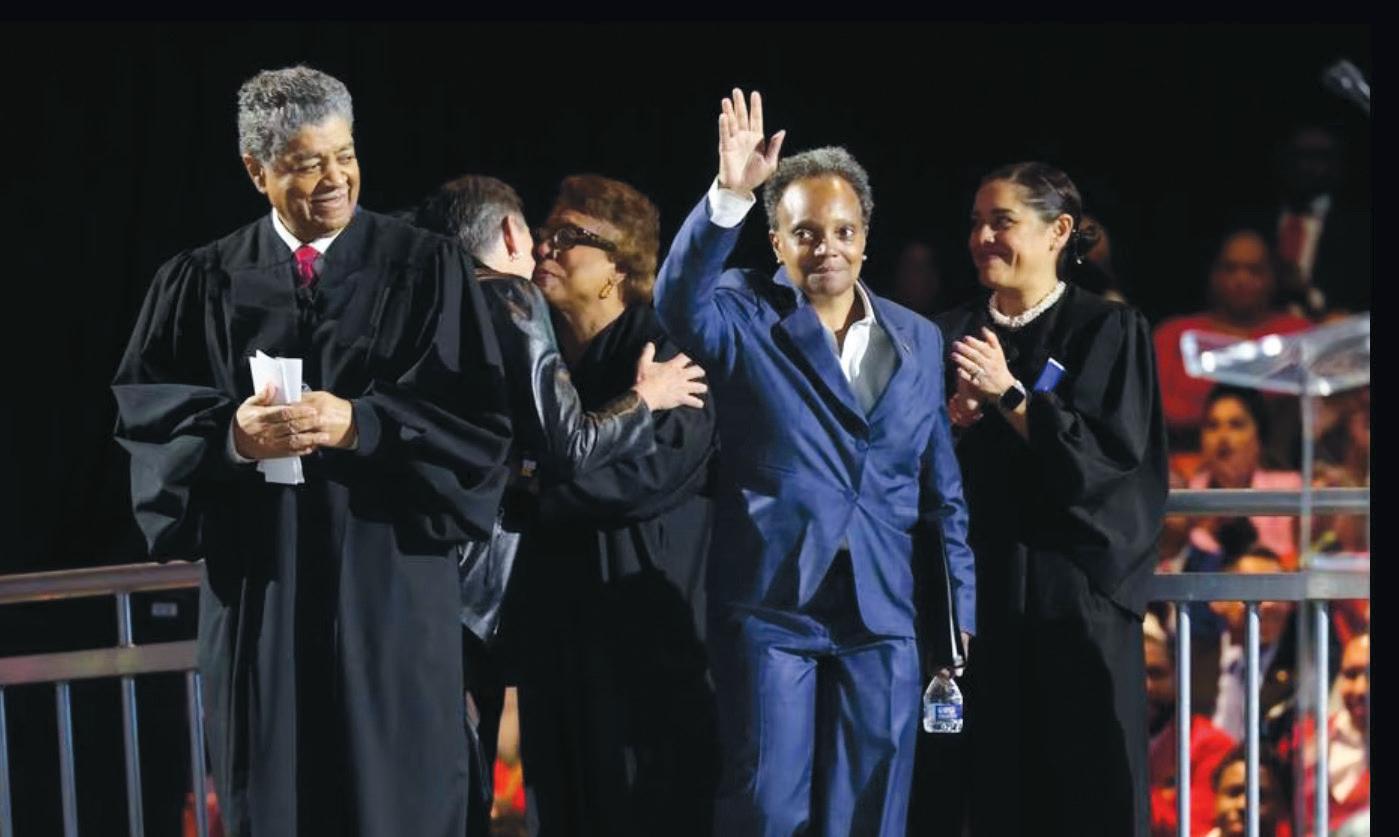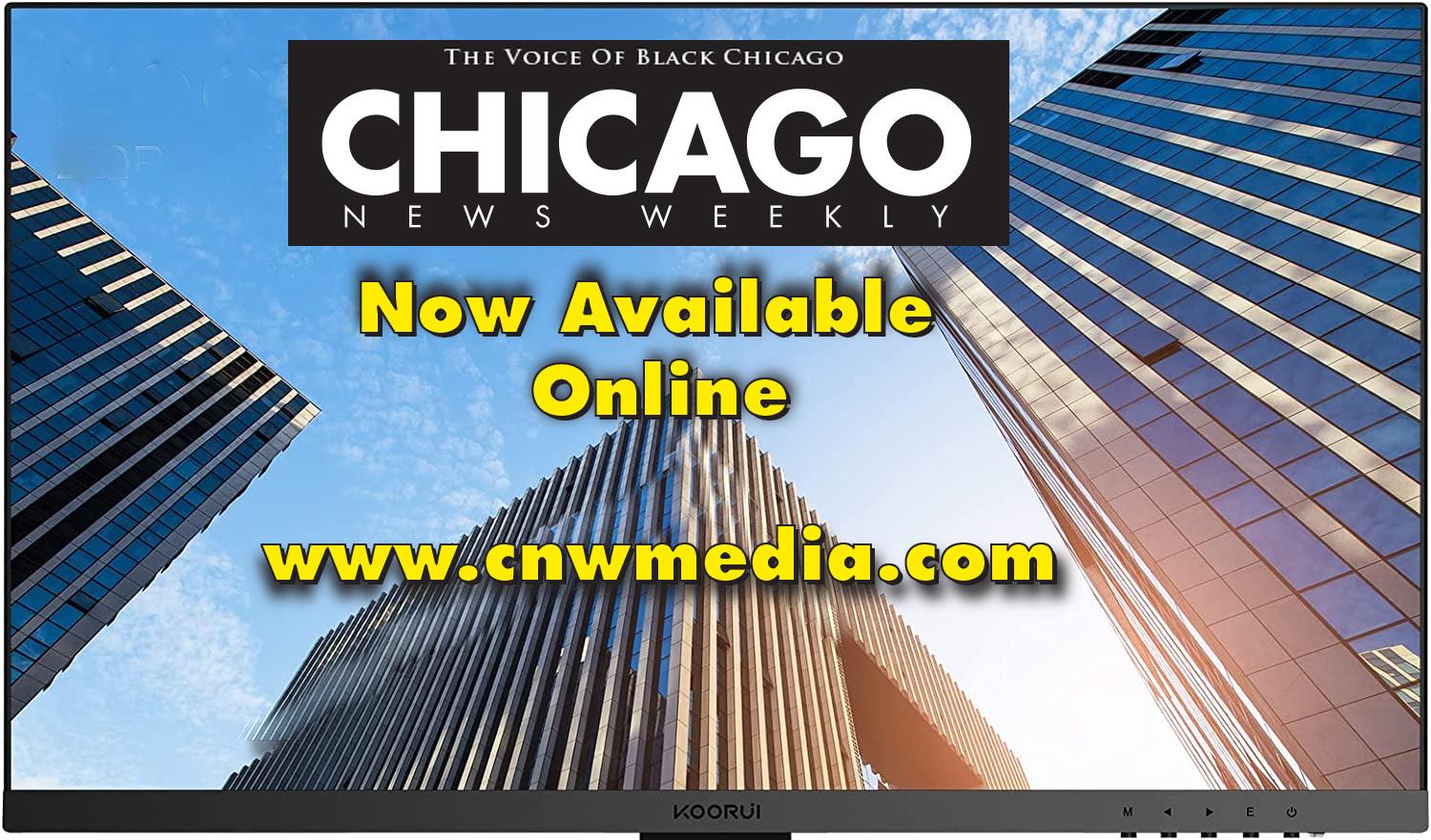
4 minute read
CHICAGO’s PEACEFUL TRANSITION OF POWER
from May 17,2023
by cnwmedia.com
Cheryl Mainor Norman Publisher
On Friday, May 12, 2023, Lori Lightfoot, Chicago’s 56th Mayor ended her position as the leader of the third largest city in the country. She left the fifthfloor City Hall office and entered into her place in the history of the City of Chicago. Her departing words were captured from a tweet, “I’m forever humbled and grateful to have served our City as mayor. These past four years were filled with challenges, yet we achieved and celebrated so much together.”
Advertisement
At the close of her last day, the City Hall lobby was filled with well-wishers who bid her farewell and she was greeted outside with confetti, bagpipes, hugs, and handshakes, and shouts of approval. The people were left with her promise, “I will be here as private citizen, continually rooting for you and every resident of our city. . . My work is not done,” she said. “I will roll up my sleeves in another form and fashion but continue on.”
The Challenge
Although Chicago did not re-elect Mayor Lightfoot, she has much to be proud of and the city has much to be grateful for. As a first-time politician/mayor, she faced some of the most tumultuous socio-political terrain one can face. Certainly, having to face the pandemic COVID-19 complicated by civil unrest was a tremendous challenge. Did she do everything right? No. Did she get us through it with a city that kept true to the mask-wearing mandates and other preventative measures to stop the Covid virus spread? Yes.
However, her handling of the unruly civil unrest did not satisfy Chicago’s North or Southside residents and received harsh criticism. Chicago was already plagued by its crime tag and mayoral candidates used it as a topic to wave and promise to turn it around. Mayor Lightfoot too, promised to turn around and transform the city’s reputation as a center for crime and corruption. And it was and remains as such. Corruption has a long history interwoven within the political machine. It’s hard to undo business as usual especially when that way of doing things becomes institutionalized as the way things are done. It takes time to beat it down. But it is coming to a halt. Slowly at first but now that the last major corruption boss’s former speaker of the Illinois House of Representatives, Michael Joseph Madigan and Edward Burke are out, the underlings are sure to disappear. Look, “Chicago Magazine” named Madigan as the fourth most powerful Chicagoan in 2012 and as the second in both 2013 and 2014, earning him the nickname “the Velvet Hammer—a.k.a. the Real Governor of Illinois.” He was known behind closed doors as the state’s real political boss and we all know that his reach was long and deep into Chicago. With them gone it seemed plausible that a new dawn had awakened but Mayor Lightfoot’s ambitious plans to lead Chicago out and away from its dark past were derailed by the deadly combination of the pandemic and its vomit—widespread looting following the murder of George Floyd by Minneapolis police.
The Straw that Broke the Camel’s Back.
Lightfoot’s task became presiding over the city’s most tumultuous era in generations, one marked by enormous strain on every element of civic life and the twin crises of COVID-19 and civil unrest.
Faced with so much, worst of all was the mayor’s inability to maintain her connection with stakeholders and public officials who could help her forge a reorganization agenda that would be palpable to her supporters. If there was any major failure on her part, it was the loss of the initial support that she did not nurture and cultivate.
But she did much in the four years that she was in office to leave a mark. “When we work to achieve equity, what we really mean is we are looking at our history and the deep scars that systemic racism, machine politics, and disinvestment have left,” Lightfoot said bidding farewell to Chicago. The solutions, she said, “won’t come overnight. But our administration created real change and planted seeds for the transformation of our city to right these historic wrongs.”
Indeed, where Lightfoot experienced most success was in putting a spotlight on Chicago’s inequities and advocating to reverse deeply engrained racial exclusion and social-economic inequity. During her term, Lightfoot’s administration spent millions of dollars in public funds working to implement public and private development in neighborhoods, particularly on the south and west sides that have experienced generations of disinvestment. Invest South/West was touted as a top strategic economic development program.
In truth, some of the programs developed under the tagline Invest South/West had been put into place prior to her election. But she did follow through recognizing its importance and it grew, accomplishing some good things. Her Invest South/West steered many projects and redirected builders to underserved communities. Many of them, in places the investment dollars would not have flowed had it not been for the program.
One major star in Lightfoot’s crown is that she made possible the elected civilian oversight board of the Police Department. Naysayers express concern that the agency lacks what it takes to make a difference, as it only has limited power to change department policy. But, there was a robust response by citizens eager to fill the board, who ran and were elected, and the city is hopeful that this will be an important cog in the wheel needed to right the ship in the City’s quest to rehabilitate and perhaps reshape what public safety is for Chicago.
The Conclusion
Monday, May 15th at the inauguration of the 57th Mayor Brandon Johnson, following her introduction, the crowd stood up and applauded her noting that somehow, they knew that she had done her best. They were appreciative. She then announced, “. . . this is a peaceful transition of power,” and the crowd roared again with applause.
Best wishes to Former Mayor Lightfoot, and Thank you for your service.











